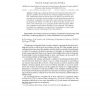704 search results - page 1 / 141 » Learning the Ideal Evaluation Function |
GECCO
2003
Springer
13 years 10 months ago
2003
Springer
Abstract. Designing an adequate fitness function requiressubstantial knowledge of a problem and of features that indicate progress towards a solution. Coevolution takes the human ...
GECCO
2007
Springer
13 years 11 months ago
2007
Springer
This paper analyzes the behavior of a selectorecombinative genetic algorithm (GA) with an ideal crossover on a class of random additively decomposable problems (rADPs). Specifical...
IDEAL
2003
Springer
13 years 10 months ago
2003
Springer
This paper introduces generalisation concept from machine learning research and attempts to relate it to the evolutionary research. Fundamental concepts related to computational le...
JAIR
2010
13 years 3 months ago
2010
While traditional research on text clustering has largely focused on grouping documents by topic, it is conceivable that a user may want to cluster documents along other dimension...
ICML
2005
IEEE
14 years 6 months ago
2005
IEEE
We analyze skewing, an approach that has been empirically observed to enable greedy decision tree learners to learn "difficult" Boolean functions, such as parity, in the...

